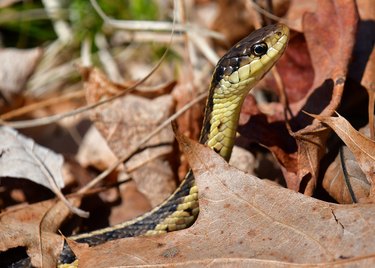
There are 34 species of snakes in Tennessee, and four are venomous. These four are the copperhead, timber rattlesnake, western cottonmouth, and pygmy rattlesnake. If you encounter any of these snakes while in the state, there are strict rules about whether or not you can harm them. There are also rules about snake ownership in the state.
Killing and Capturing Snakes
Video of the Day
The law in Tennessee is quite clear about how to handle a snake you encounter in the wild: don't. It is illegal to catch, keep, or kill any snakes you encounter, even if they are venomous. It's important that you be mindful and alert when in areas where a snake encounter is likely and to watch where you step. If you do see a snake, go the other way and make sure you give it a wide berth.
Video of the Day
Because capturing wild snakes is illegal, you must follow certain rules if you wish to keep a snake as a pet. You must buy any snakes kept as pets from a reputable source. You must keep information about that source as well as any receipts to prove that your snake was lawfully purchased and not captured from the wild.
Exceptions to the Law
Although Tennessee law expects you to leave snakes alone, exceptions are made if you find yourself faced with an immediate threat. You may, for example, stumble upon a snake inside your home. If so, you are allowed to kill it. You may also kill a snake if it poses a threat to your property, which in this case means livestock. A venomous snake hanging around your cows, for instance, or one that is eating your chickens is fair game.
Whenever possible, it's best to try to avoid even problem snakes to reduce the possibility of a bite. If you can, chase off the snake with a jet of water from your garden hose from a safe distance. Snakes prefer living in a mellow environment and are easily chased off using this method. This is particularly wise when dealing with a venomous snake, as most snake bites happen when the snake is molested by someone who gets too close. If you feel you must kill the snake, do so as carefully and humanely as possible.
Why Killing Snakes Is Illegal
Making the killing of snakes illegal in Tennessee was not an arbitrary decision. It's true that the law helps to keep people safe. Discouraging people from approaching snakes means helping to prevent bites, but protecting snakes is also important for environmental reasons.
Snakes are an important part of Tennessee's ecosystem. Snakes eat rodents, which not only limits the number of rodents but also the fleas and ticks they carry, both of which can have a negative impact on human health. Fewer rodents also means fewer house fires started by rodents gnawing on electrical wires and less crop damage from hungry pests.
Laws About Pet Snakes
In Tennessee, private persons are not allowed to own any venomous snakes or keep snakes that were illegally captured from the wild. You may, however, own nonvenomous snakes if they are legally acquired from a dealer or pet store. Once you own a snake, however, remember that it becomes your responsibility.
If for some reason you decide you can no longer care for the snake, you must sell it or give it to someone who can care for it. Under no circumstances are you allowed to release your snake into the wild, even if it is a species native to the area. Pet snakes may introduce parasites and diseases into the wild, and many fail to fend for themselves after living as pets. No one in Tennessee may release an animal without a Wildlife Capture, Transport, and Release Permit.